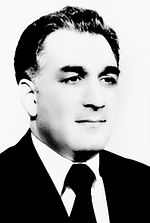Hafizullah Amin, Date of Birth, Place of Birth, Date of Death
TweetHafizullah Amin
politician, former Afghan head of state (1979)
 Date of Birth: 01-Aug-1929
Date of Birth: 01-Aug-1929
 Place of Birth: Paghman, Kabul, Afghanistan
Place of Birth: Paghman, Kabul, Afghanistan
Date of Death: 27-Dec-1979
Profession: politician
Nationality: Afghanistan
Zodiac Sign: Leo 
About Hafizullah Amin
- Hafizullah Amin (Pashto/Dari: ???? ???? ?????; born 1 August 1929 – 27 December 1979) was an Afghan communist politician during the Cold War.
- Amin was born in Paghman and educated at Kabul University, after which he started his career as a teacher.
- After a few years in that occupation, he went to the United States to study.
- He would visit the United States a second time before moving permanently to Afghanistan, and starting his career in radical politics.
- He ran as a candidate in the 1965 parliamentary election but failed to secure a seat.
- Amin was the only Khalqist elected to parliament in the 1969 parliamentary election, thus increasing his standing within the party.
- He was one of the leading organizers of the Saur Revolution which overthrew the government of Mohammad Daoud Khan.
- In 1979 he named himself president, prime minister, and chairman of the Khalq wing.
- He has been described as "ruthless" and a "radical Marxist".Amin's short-lived presidency was marked by controversies from beginning to end.
- He came to power by disposing of his predecessor Nur Muhammad Taraki and later ordering his death.
- Amin made attempts to win support from those who revolted against the communist regime which had begun under Taraki, but his government was unable to solve this problem.
- Many Afghans held Amin responsible for the regime's harshest measures, such as ordering thousands of executions.
- Thousands of people disappeared without trace during his time in office.
- The Soviet Union, which was dissatisfied with Amin, intervened in Afghanistan while invoking the Twenty-Year Treaty of Friendship between Afghanistan and the Soviet Union.
- Amin was assassinated by the Soviets on 27 December 1979 as part of Operation Storm-333, having ruled for slightly longer than three months.
Read more at Wikipedia

